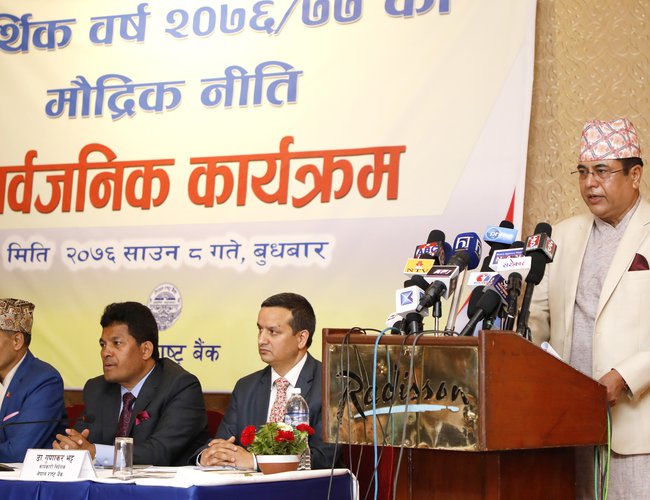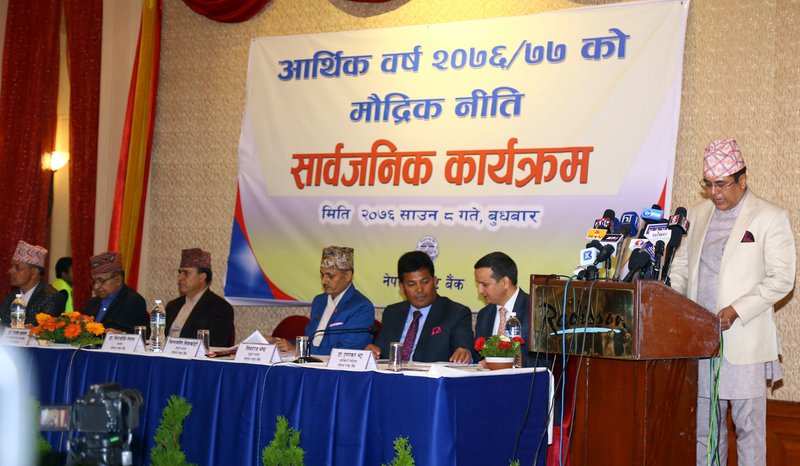
With very nominal loanable money, financial institutions have been suffering high. However, by opening the door for banks to borrow money from outside, New Monetary Policy has given a way out.
Nepal Rastra Bank has unveiled the Monetary Policy for the fiscal year 2019-20 with major highlights of promotion of investment in productive sectors, control of interest rate and encouragement for financial institutions to go for merger. It also focused on addressing issues of loanable funds crunch and credit growth in priority sector.
Unveiling the policy, governor of Nepal Rastra Bank Dr. Chiranjibi Nepal said that the policy has aimed to support the current budget’s target to achieve 8.5 percent growth rate.
“The Monetary Policy focuses on achieving the target set by the budget,” said governor Dr. Nepal. He said that the policy also solely focuses on increasing the access to finance to achieve higher growth.
He said that the new interest rate will increase the investment in productive sector. In the monetary policy unveiled, Nepal Rastra Bank (NRB) has opened door for banks to borrow money from pension funds and hedge funds, too, in order to ease the liquidity shortage in the market.
The Monetary Policy has also made it mandatory for commercial banks to issue debentures/corporate bonds amounting to 25 per cent of their paid-up capital by end of the fiscal.
The monetary policy has tightened the loan for real estate and hire-purchase. According to the policy, banks have to provide loan for real estate and hire-purchase by looking at the earning.
NRB has said provisions will be introduced to allow commercial banks to borrow in convertible currency from foreign institutions, including pension funds and hedge funds.
The central bank has also allowed banks and financial institutions to collect fixed deposits in foreign currency from organizational foreign depositors and non-resident Nepalese. However, such deposits should have maturity period of at least two years. Bank and Financial Institutions (BFIs) can disburse cent per cent of such deposits as loans in Nepali currency.
NRB has also reduced the maximum interest rates on loans floated under the general refinance fund of NRB that BFIs can take to seven per cent from eight per cent. The central bank said that refinancing loans of up to Rs 1 million will be issued to BFIs, on the back of good loans, at three per cent interest rate against five per cent previously.

“The duration to maintain the spread rate at 4.4 per cent has also been extended to 2021 mid-July for the commercial banks that go for the merger. Similarly, they need not to get approval from the central bank to expand their branches,” said Dr. Nepal. “Cooling period provision will also not be applied for those institutions.”
According to NRB provisions, members of the Board of Directors, chief executive officers, deputy CEOs of the Bank and Financial Institutions (BFIs) cannot join other BFIs in any capacity for at least six months from the quitting of their previous job.
The Monetary Policy has also announced incentives for microfinance merger as well. They will also enjoy provisions like ‘no cooling period’ and increased lending ceiling to Rs. 1.5 million from existing Rs. 1 million collateral-based lending to the group members in the rural municipality. They also can take their staff’s salaries and allowances as deposits.
The new Monetary Policy has asked the commercial banks to issue bonds equal to 25 per cent of their paid-up capital. The money raised from selling the bonds can be mobilized in loans.
Although the market sector is yet to react on the monetary policy, the policy failed to stimulate share market which is expecting to see some concessions to lending from the bank and invest in the share. The share market, which has been facing barriers for years, will have to wait for more time to get bullish.
- TANAHU HYDROPOWER PROEJCT: A Significant Achievement
- Apr 15, 2024
- AMBASSADOR HANAN GODAR: Sharing Pain With A Nepali Family
- Mar 30, 2024
- VISIT OF KfW AND EIB TO NEPAL : Mission Matters
- Mar 25, 2024
- NEPAL BRITAIN SOCIETY: Pratima Pande's Leadership
- Mar 24, 2024
- NEPAL ARMY DAY: Time To Recall Glory
- Mar 15, 2024
















